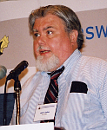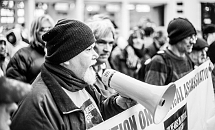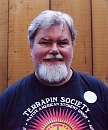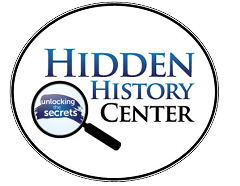John Judge Was Born 69 Years Ago Today
John Judge was born 69 years ago today and died all too soon of complications from a stroke in April 2014. In June 2014, I posthumously accepted John’s invitation to join the board of the Museum of Hidden History, a 501(c)(3) non-profit he established in Washington D.C. in April 2012. The current project focus of the Museum is the Hidden History Center located in York, Pennsylvania, and on the web at <hiddenhistorycenter.org>.
The Museum honors John today with this announcement of an extended hypertext presentation of John Judge, Leading Change: A Transformational, Quiet Servant Leader. This is a case study written by former Congresswoman and 2008 Green Party Presidential Candidate Cynthia McKinney in 2012 as part of her PhD leadership studies program. As Ms. McKinney describes some of the scope explored in this remarkable paper:
I decided that because of the brilliance and the dedication of this gentleman, that in my own PhD leadership studies I would write a paper on him and the type of leadership that he demonstrates. . . . John Judge is perhaps one of the most important unknown historians of our generation. . . . I chose to research the story of John Judge because he startled me into not one, not two, but many, disorienting dilemmas. I became so fascinated with John that I wanted to pierce deep down inside his world. . . . There is a piece of each one of us, including me, inside this very special man. Imagine if we could flip the switch and have a little of John inside each and every one of us. And while I might not agree with John on every issue, I say that if we had even just a few more John Judges in this country, not only our country, but also our world, would be a vastly different and much-improved place. . . . In this paper, I give the floor to John and the other participants [Cyril Wecht, M.D., J.D., Peter Dale Scott, Ph.D., Tamara Carter, Joe Green, Michael Nurko]. I give them the opportunity to be heard in full context.
John was a fount of inspiration and illumination like no one else I have ever met. His grasp of the historical context of events, amplified by profoundly expansive critical thinking faculties and an encyclopedic memory, and seasoned with a beguiling, ironic, and farcical sense of humor, caused me to ponder and evaluate deeper implications and understanding of how our political, economic, social, and religious systems of authority operate. He is quoted at length in this case study. A few excerpts follow in the hopes they may incite you to explore more of this uncommon work:
In Zen, the master teaches the students to focus on the activities and ideas conveyed and to take them seriously. Able to discern the matrix of assumptions that control the consciousness of students, they ask a question and pose a puzzle, a koan, that cannot be answered without breaking out of those assumptions. But since the master has asked it, neither can the question be ignored or dismissed. This is done because, when one breaks out of one paradigm, one matrix, they may just jump into another, or they may transcend them and reach satori or realized consciousness that goes beyond the tunnels of perception and assumption to hold several paradigms at once.
For me, from a perspective of political analysis and social change, the contradictions raised by the best evidence in these historical events are the koan that can be thrown in to disrupt the assumptions and distortions of the official deceptions and allow not only a counter-narrative of events and causes, but possibly open the minds of others to the point that they can pose their own puzzles against the realities they have been taught or accepted blindly.
Finally, these assassinations are profoundly anti-democratic acts. We cannot act responsibly if we cannot know our own history and its implications. The past is prologue.
I found these assassinations to be Rosetta stones whose close inspection and study revealed the whole and made history comprehensible instead of confusing and disempowering.
If we want to live in a democracy we must be informed. Uninformed citizens making decisions is farce, Madison said. Jefferson knew that information flow is more central to democracy than the mechanisms by which popular will is carried out. He said he would always choose a newspaper without a government rather than the opposite. If we want to understand our present or envision our future, we must be able to be clear about our past. The burial of our history since WWII by the National Security State makes this difficult if not impossible.
For all these reasons, I work for transparency, the accurate reconstruction of historical events and assassinations, and the engaged involvement in citizens to work for the claims of justice and of history itself in understanding the truth about these events. . . .
Current U.S. policy condones and is institutionalizing the capability and legality of political assassinations of declared political enemies, with or without trial or appeal to innocence, here or abroad, and done remotely by drones or more directly by covert operations based on intelligence rather than criminal evidence, and including American citizens. New laws are being proposed and enacted that will create a Battle Zone inside NORTHCOM, making the US a military operations zone, and empowering the military to override state National Guard units, local police and others to make arrests without warrant, and to imprison without trial or habeas corpus rights of appeal, for indefinite periods those suspected of harboring or aiding A1 Qaeda, and to conduct military tribunals rather than civilian trials in considering their conviction and execution. These laws would end the long established principle of Posse Comitatus, and the separation of military and police function in a democratic society, as well as overriding habeas corpus rights that date back to the Magna Carta. . . .
In the 20th century, assassinations have served to allow the rise of political factions or economic groups, to control governments abroad led by popular leaders, assisted the plans of those hoping to overthrow tyranny or install it, to destroy the leadership and cohesion of grass roots movements for social change, and to frighten and disorient societies moving toward real democracy. Hundreds, if not thousands of political assassinations of elected officials, political organizers, witnesses to crimes and activists have marked and changed the direction of our national and global history in the decades leading up to and since WWII. . . .
In 1968, the double assassinations of Dr. Martin Luther King, Jr. and Robert Kennedy shattered hope and exposed the violent underpinnings of the corruption in American military and police organizations. I held a sign in front of the Kennedy Student Union at the University of Dayton the day after King was killed, “The King of Love Is Dead”. I actually felt strongly that Robert Kennedy would be shot that night in Los Angeles and tried unsuccessfully many times to reach the Ambassador Hotel to warn someone. Ironically, it was the hired security surrounding him that participated in his murder.
I began to collect a body of literature and government reports on these murders and others, like the assassination of Malcolm X and other activists and civil rights members. It led me back to the history of WWII and the role played by Nazi war criminals in establishing the post-war intelligence networks in Europe and the United States and the beginnings of the Cold War and the rise of the permanent war economy.
In 1972, the day after the Watergate break-in, I saw the five names of those arrested on site and they all were known to me because they had been part of the Bay of Pigs and the history of the assassination of President Kennedy.
One of them had testified to the Warren Commission. I asked my mother, still living in DC, to clip the Washington Post and Evening Star if she saw any articles about the arrest. A few weeks later, the Realist magazine carried the first issue of Mae Brussell’s Conspiracy Newsletter with an article titled ‘Why Was Martha Mitchell Kidnapped?’, breaking down the entire structure of the Watergate break-in, going all the way up to the White House, and another on the ties of Nazis to the rise of Richard Nixon. I contacted Mae immediately because I had been working on some of the same leads and history. . . .
Whatever intelligence I have I credit to my mother, who rose to a position as the highest paid woman employee at the Pentagon over the 30 years she worked there, and who had a security clearance five levels above Top Secret.
I began to question political pronouncements from an early age, and social norms as well. I remember a bitter fight at age 10 or so with my parents who wanted me to dress up for a party because people would not like me otherwise. I said that if people liked me for my clothes I did not want those people to like me. As I mentioned, I refused to get under my desk for an atomic air raid drill and was sent to the principal’s office. I was horrified that adults could have such a weapon or use it, and then even more frightened when they offered me no protection at all against it in the drill.
My parents were frightened by Senator Joe McCarthy and his anti-communist crusade, fearing that innuendo or rumor would get them fired. President Eisenhower’s lies about the U-2 and spying shocked me into realizing that not only our enemies did bad things or lied to cover them up.
Here’s to a most uncommon common man whose life and energies were devoted to urging this nation live up to its highest calling of genuine liberty and equal justice for all life on Earth and to caring for the Earth and all its kin. John lived his life, and gave everything he had, to honor and serve Life’s needs.




